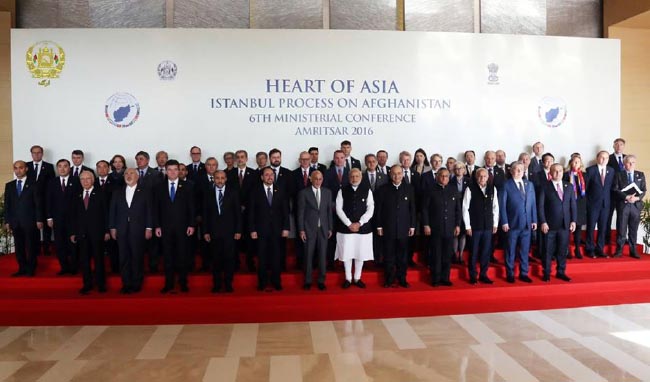Terrorism is a global scourge and a serious threat to Afghanistan and Pakistan. Militancy continues unabated and has sacrificed thousands of life within the two last years. The National Unity Government (NUG) encountered with two radical leaders of the Taliban: Mullah Akhtar Mansour, who was killed in May in Pakistan’s soil, and his successor who orchestrated deadly attacks from across the border. With mounting insurgency in Afghanistan, the officials spoke frankly about Taliban’s safe haven at national and international conferences not to show a hostile attitude but prompt Pakistan to strengthen the counter-insurgency.
At the Heart of Asia Conference in the northern Indian city of Amritsar, President Muhammad Ashraf Ghani said Taliban insurgency would not survive a month if it lost its sanctuary in neighboring Pakistan, urging it to take on militant groups on its soil instead of giving Kabul financial aid. According to him, last year, Afghanistan suffered the highest number of civilian casualties and military related deaths in the world, and aimed at getting regional players together to help stabilize the country.
Ghani’s direct words and negative answer to Pakistan’s financial aid provoked a sense of anger among Pakistan’s political pundits and Pakistani newspapers are replete with words of sarcasm about Ghani. Unlike the former president, Ghani is very frank and direct – he speaks outspokenly. Moreover, his attitude towards the Taliban is serious and hostile and does not call them “discontented brothers”. He will not release the Taliban prisoners, as Karzai did, as a precondition for peace talks since the Taliban are not seeking peace genuinely.
Following the withdrawal of US army and the reduction of its military role into advisory one in 2014, Afghan soldiers shouldered a heavy responsibility and encountered with unmitigated militancy. In other words, the NUG inherited a total destruction in social, political and economic arenas. Similarly, the Taliban remained the sworn enemy of Afghanistan and carried out heavy offensives under Mansour and lately under their radical leader Mullah Haibatullah Akhundzada – who plays more destructive role. Ghani did not follow Karzai’s footstep regarding peace such as travelling to Pakistan twenty times without a tangible result or releasing the Taliban’s prisoners. He left two choices for the Taliban: Fire or ceasefire. He called all warring parties, mainly the Taliban, to come to negotiating table and asked Pakistan to play its role honestly in terms of brining peace in the country. Pakistani officials vowed to nudge the Taliban to peace table and hosted a talk between the Afghan government and Taliban representatives at the popular tourist resort of Murree in July 2015. Sadly, this was proved abortive following the revelation of Omar’s death. To resume peace talks, Afghanistan, Pakistan, China and the United States held second round of talks in Kabul on January 18, 2016 and called the Taliban again to stop violence and bloodshed and join the peace process – it did not give the desired fruit either.
Despite all tireless efforts by Afghan government, the Taliban refused to hold talks and Afghan officials believed that Pakistan did not show tendency in a peaceful Afghanistan. Tension aroused between Kabul and Islamabad which ensued by strong rhetoric. The relations fluctuated based on Afghanistan’s security situation. The relation was at a low ebb when Ghani spoke with strong tone at NATO Summit in Warsaw stating, “Our regional initiatives with neighbors are beginning to yield significant cooperative dividends. The exception is with Pakistan – despite clear commitments to a quadrilateral peace process; their dangerous distinction between good and bad terrorists is being maintained in practice”.
Ghani’s strong tone in Warsaw and Amritsar aroused the anger of Pakistani political analysts. Being hurtful or not, being frank is one’s good characteristic and no one is supposed to bash a person for being outspoken. Moreover, he has the authority whether to accept or reject a country’s aid and there is no issue of hostility. He said that Pakistan had better use that in combating terrorism – is it really hurtful?
Additionally, cultivating a friendly relation with any other country does not necessarily mean to adopt a hostile relation with Pakistan, as it has been interpreted so, and vice versa. It will put a country’s independence under question to be told to have or dismantle its relation with a particular country.
Afghanistan is in pursuit of regional support to counter insurgency more effectively. Pakistani officials have constantly claimed to seek sustainable peace and stability in Afghanistan – which will be pivotal to the region – and stated that resuming peace talks will be an effective mechanism. However, the hope for a fruitful talk has been shattered due to repeated cul-de-sac. In a nutshell, the trust issue between Kabul and Islamabad widens the gap rather than bridging it. It is believed that if Pakistani officials can persuade the Taliban to hold direct talks with Kabul genuinely, Afghanistan is always ready to accept it as the door for negotiation is open for years.
Furthermore, the Taliban will have to stop violence and bloodshed for paving the ground for peace and gaining the trust of Afghan government. If the Taliban persists on continuing violence, the second option, military deal, will be the last and reasonable resort, isn’t it?
Home » Opinion » The Controversy over Ghani’s Rhetoric
The Controversy over Ghani’s Rhetoric
| Hujjatullah Zia

